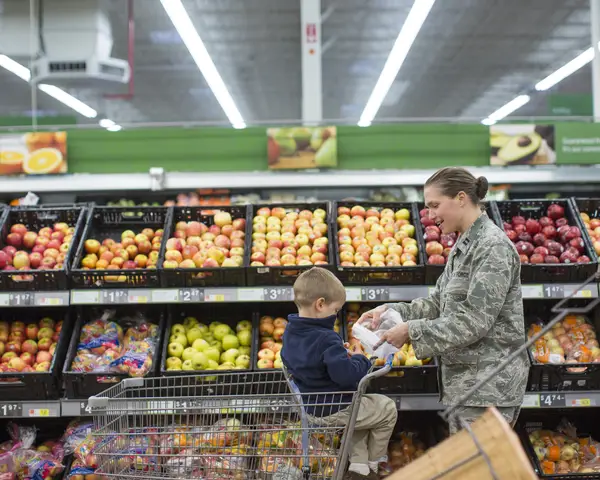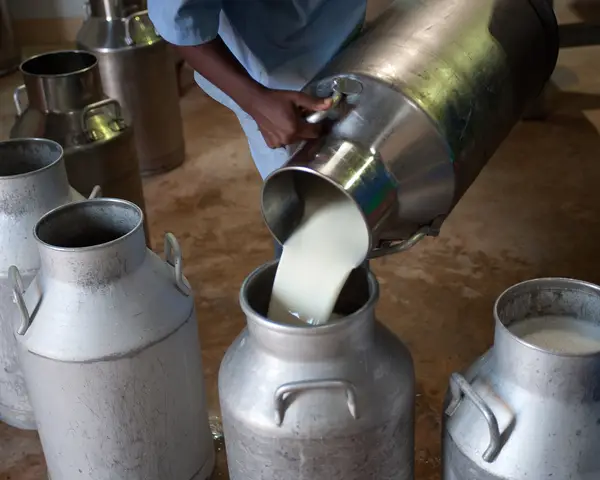Reducing hunger and increasing food security for families around the world
We work with government agencies, foundations, and other clients to inform programs and policies that aim to support the availability, accessibility, and affordability of food, thus helping to address factors that may lead to negative health outcomes. We conduct research related to the planning, design, implementation, evaluation, and dissemination of interventions to reduce hunger and increase food security, and provide low-income families domestically and internationally access to healthy food, a nutritious diet, and nutrition education.

Evaluation of WIC Nutrition Education
Does exposure to nutrition education offered as part of the Food and Nutrition Service’s (FNS’s) Special Supplemental Nutrition Program for Women, Infants, and Children (WIC) program lead to improvements in participants’ food intake and other behaviors? RTI conducted a pilot study at six WIC sites to assess the feasibility of conducting a national evaluation of WIC nutrition education. The pilot study used a mixed-methods approach to describe the implementation of nutrition education at each site and a dose-response research design to assess the impact of exposure to WIC nutrition education on participant outcomes. Based on the results of the pilot study, we made recommendations for the design for a national evaluation study.

Examining the Potential Impacts of the Military Hunger Prevention Act on SNAP Eligibility
RTI conducted a study for the USDA, Economic Research Service (ERS), to examine how eligibility for SNAP within active-duty families would change if the Military Hunger Prevention Act were enacted. The study also compared the characteristics of active-duty military personnel who appear to qualify for SNAP based on reported income and dependencies but do not participate in the program with active-duty military personnel who do participate in SNAP. Examining the issue of SNAP and the military has important implications for current research and policy as Congress considers legislation that could affect food-insecure active-duty service members receiving the Basic Allowance for Housing.

Evaluation of the DC Healthy Tots Act (HTA) Policy Implementation
RTI assisted the National Farm to School Network in assessing the implementation and impacts of the HTA local food reimbursement incentive. We collated and analyzed secondary data, conducted a survey of early childhood education sites that participate in FNS’s Child and Adult Care Food Program, and conducted semi-structured interviews with HTA implementing organizations and relevant producer and food system stakeholders. Based on the study results, we offered key recommendations for developing more impactful local food incentive policies for early childhood care settings.

Scanner Capability Assessment of the Supplemental Nutrition Assistance Program (SNAP)-Authorized Small Retailers
The Agricultural Act of 2014 (2014 Farm Bill) requires all SNAP-authorized retailers to use scanning technologies that can distinguish between SNAP-eligible items and ineligible items when redeeming SNAP benefits. RTI conducted interviews with vendors, a nationally representative survey of small SNAP-authorized retailers, and in-depth interviews with a subset of retailers. We analyzed the data to estimate adoption rates for scanning technology among small SNAP-authorized retailers to assess readiness for meeting the Farm Bill requirement, describe the barriers and benefits to adopting scanning technologies, and provide cost estimates for nonadopting retailers to comply with this requirement.

Enhancing Milk Quality and Consumption for Improved Income and Nutrition in Rwanda
Under a grant from the Feed the Future Livestock Systems Innovation Lab, RTI collaborated with the International Livestock Research Institute (ILRI) to test the child nutrition impacts of adding social behavior change communication to the Government of Rwanda’s livestock asset transfer program. The study was a three-arm cluster-randomized evaluation that included surveys with a cohort of mothers and children and endline qualitative data collection. Exposure to the intervention was associated with increased frequency of child milk consumption. RTI and ILRI conducted a follow-on study to engage fathers in supporting their children’s nutrition. The fathers’ intervention was associated with increases in children’s consumption of milk, eggs, and beef.

Effects of SNAP Participation on the Healthfulness of Food Purchased by Households with Children during the COVID-19 Pandemic
Under a grant with Healthy Eating Research (HER), a national program of the Robert Wood Johnson Foundation, RTI is conducting a study to determine how economic disruptions due to the COVID-19 pandemic, and concurrent changes in the Supplemental Nutrition Assistance Program (SNAP) affected the nutritional quality of food purchases by households with children. Using household-based scanner data, we are comparing five measures of nutritional quality of food purchases between households with children that participate in SNAP versus nonparticipants, and assessing whether changes in SNAP during the pandemic affected the nutritional quality of food purchases. In addition, we are assessing the demographic characteristics of SNAP participants and food spending patterns of new entrants into the program during the first year of the pandemic.
Related Projects
Nutrition and Wellness in North Carolina Juvenile Justice Facilities
Read More about Nutrition and Wellness in North Carolina Juvenile Justice Facilities















